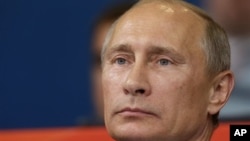MOSCOW —
As gray winter skies descend on Moscow, Russians are adjusting to a political winter. Since taking office nearly six months ago, President Vladimir Putin has methodically reduced civic space in Russia by advocating new laws on treason, blasphemy, libel, Internet censorship and curbs on public protest.
Then on Monday, Russians saw a new twist: a well-known opposition activist, Leonid Razvozzhayev, shouting to reporters that he had been kidnapped off a sidewalk in Kyiv, Ukraine, and forcibly brought to Moscow for trial.
Oleg Kashin, a radio analyst for the Russian daily Kommersant, says get used to it. President Putin, he says, is taking Russia down the road of neighboring Belarus, a nation run for 18 years by Alexander Lukashenko, often called "the last dictator of Europe."
What may hold the Russian president back is what analysts in Russia call “handshakeability”: Putin is still welcome in Western capitals, whereas Lukashenko is not.
Back to Soviet era
With the ruling party sweeping all governors' elections two weeks ago and a new "foreign agent" law going into effect next week, Putin seems to be taking a big political step back to the Soviet Union. For now, these conservative new laws seem to be having a chilling effect.
Masha Lipman, an analyst for Carnegie Moscow, says she sees “...a desire to intimidate the tens of thousands of people who have taken part in protests and other forms of civic activism, and indeed push them back where they used to be.”
Lipman and others say the goal is to return Russia to the apolitical days during the boom years of the 2000s. During this decade, Russians largely traded their political freedoms for the freedom to travel, to buy, and to make more money.
But now the Kremlin fears that Europe’s recession and China’s slowdown will cut prices of oil, gas and other raw materials — the core of modern Russia’s economy.
If energy prices go down, the thinking goes, Putin will draw on the new repressive powers to ride out popular protests. His six-year presidential term lasts until 2018, but, as in many oil exporting nations, he is popular only as long as he can deliver the goods.
Anti-US sentiment
To rally Russians, the Kremlin is playing the anti-American card. Amid charges that Russia’s opposition movement takes its orders from the West, the Kremlin ended a 20-year-old USAID program this month.
Lipman charges that state television paints a picture of Russia’s opposition as “either receiving financing from the West or being inspired by the West, or colluding with the West [or] associating themselves with the West, which, as the anti-American propaganda goes, is always seeking to do harm to Russia, to weaken Russia and to [do] all kinds of bad things to Russia.”
But while anti-American propaganda hits new, post-Soviet heights in Russia, Aeroflot flights between Moscow and New York are packed.
This, says Kashin, presents a dilemma for President Putin. Russia is not like Belarus, where the elite is hermetically sealed from the outside world.
“The big difference is that Putin is very closely tied into the West,” said the radio analyst. “Political isolationism hits his inner circle.”
Kashin says Russian elites send their children to universities in the West, where they also own bank accounts and real estate.
But if Russians start getting 20-year jail sentences for talking to foreigners, and if too many foreign diplomats are kicked out, Putin may lose his "handshakeability" in the West.




